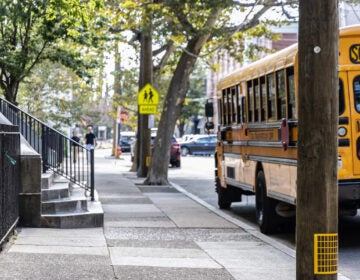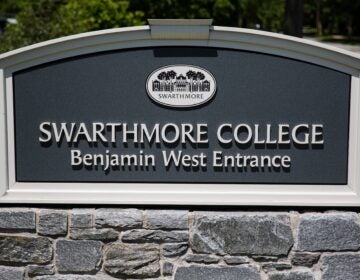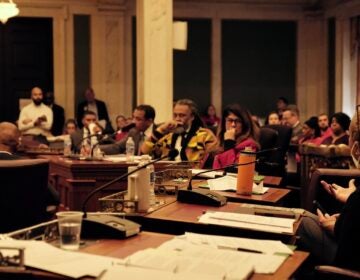Philadelphia School District and local colleges prepare for SEPTA cuts that could disrupt student commutes
The city school district and local colleges are making plans to help students and staff navigate SEPTA’s looming service cuts.
Listen 1:20
A train from SEPTA’s Regional Rail service arrives at Suburban Station (Bastiaan Slabbers for WHYY)
From Philly and the Pa. suburbs to South Jersey and Delaware, what would you like WHYY News to cover? Let us know!
The Philadelphia School District and area universities are preparing for SEPTA’s service cuts that could disrupt the commutes for thousands of students on Monday, Aug. 25, the district’s first day of school.
Most universities in the Philly region have already begun their fall semesters. They are expanding parking and shuttle services, and suggesting bike sharing and the use of SEPTA’s trip-planning tool.
SEPTA is facing a $213 million budget deficit, and released its reduced service schedule Aug. 6. At the time, agency GM Scott Sauer said the reduced schedule would go into effect unless a new funding deal was reached by Aug. 14. That did not happen. Gov. Josh Shapiro and state lawmakers continue to negotiate the state budget, which was supposed to be passed by June 30.
The first phase of reduced SEPTA service begins Sunday, Aug. 24, and will result in a roughly 20% cut to services. That will be followed by a 21.5% fare increase Sept. 1 and a hiring freeze later that month. On Jan. 1, another round of service cuts will eliminate five Regional Rail lines, cut 18 additional bus routes and slap a 9 p.m. curfew on all rail service. All told, it would amount to a 45% cut in services.
“These service cuts are unprecedented, not just for SEPTA,” said Jody Holton, SEPTA’s chief planning and strategy officer, in a statement. “No major transit system has had to make cuts this drastic.”
Complicating matters further, the district’s contract with the teachers union expires Aug. 31. The issues include wages, benefits and working conditions.
Arthur Steinberg, president of the Philadelphia Federation of Teachers, said the union and the district have made some progress. The PFT wants to reach an agreement, he said, but will strike if necessary.
The SEPTA cuts could be a hugely disruptive factor.
“It will complicate the school year because a great number of our employees take SEPTA to work and to school for their kids,” Steinberg said. “If they are unable to get there on time, it will throw the system into utter chaos. At the end of the day, it will affect the kids’ achievement.”
If that happens, it will help those who say public schools are failing and shouldn’t be funded, he said.
According to the Philadelphia School District, about 95,000 of the 199,000 district students use some form of district-sponsored transportation, which includes 52,000 who commute by SEPTA student fare cards. About 25,000 others use school buses or other school district vehicles, such as vans or cabs.
Another 18,000 families eligible for transportation receive a flat payment of $300 a month from the district to transport their children to school themselves.
The rest of the students who are not eligible for district-sponsored travel make their own way to and from school.
The district is communicating with SEPTA to keep up to date on plans, said Monique Braxton, the district’s chief spokesperson.
“We understand the anxiety and concerns surrounding students getting to and from school given the announced cuts in SEPTA services,” Braxton said in a statement. “We’re urging parents to devise a plan if their children’s route to school is impacted by the anticipated cuts in service.”
In addition, the district is asking parents to accompany their children to school if they are late or need to be dismissed early, she said.
Universities taking action
On Monday, Temple University issued a statement to its school community regarding the situation:
“We understand that the proposed cuts will have a significant impact on our students, faculty and staff. While we cannot replicate SEPTA services, we are taking steps to assist the Temple community during this time of transition.”
Among those steps, Temple is offering free parking at its Ambler campus lot at Butler Pike and Woods Drive tied to additional shuttle service to the Health Sciences Center on its main campus at 8 a.m. each day through Sept. 30.
Temple also reduced its daily rate for flex parking to $11 from $13 and introduced a shared parking permit for people who carpool. This option is open to all Temple community members for the semester. It allows multiple people to share a permit, but they can only park one car on campus at a time.
At the University of Pennsylvania, a spokesperson this week issued a statement: “We understand that a substantial portion of the Penn community relies on SEPTA to get to and from campus, and that major changes to public transportation can disrupt your daily routines and affect your ability to work, teach, or care for patients.”
Penn suggests that its community members consider alternative transportation. These include carpooling; the bus shuttle service, Loop Around University City, which it runs in conjunction with SEPTA; Drexel University shuttles, which are free with PennCard; and the Indego 365 bike-share program.
In addition, Penn said it plans to increase the maximum benefits of its Commuter Health Benefits program to $130 a month, up from $105 a month.
All of these schools suggest using SEPTA’s trip-planning tool, which can be found on its website.
SEPTA said that as of May 2025, an average of more than 768,000 people a day traveled on the transit system’s buses, trolleys, subways and Regional Rail lines, a 7% increase from the same month in 2024.

Get daily updates from WHYY News!
WHYY is your source for fact-based, in-depth journalism and information. As a nonprofit organization, we rely on financial support from readers like you. Please give today.







